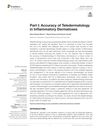 47 citations,
May 2002 in “Journal of Cutaneous Medicine and Surgery”
47 citations,
May 2002 in “Journal of Cutaneous Medicine and Surgery” Pregnancy can cause normal skin changes that usually go away after childbirth and don't need treatment.
 45 citations,
September 2011 in “Journal of the European Academy of Dermatology and Venereology”
45 citations,
September 2011 in “Journal of the European Academy of Dermatology and Venereology” Obese people have more skin problems like stretch marks and infections, which get worse with higher obesity levels.
 41 citations,
June 2010 in “Anais Brasileiros de Dermatologia”
41 citations,
June 2010 in “Anais Brasileiros de Dermatologia” Isotretinoin is safe and effective for acne, with common side effects like dry lips; serious side effects are rare.
 37 citations,
January 2013 in “Postepy Dermatologii I Alergologii”
37 citations,
January 2013 in “Postepy Dermatologii I Alergologii” Isotretinoin effectively reduces acne but causes dry skin, higher skin pH, more redness, and hair loss.
 30 citations,
November 2008 in “Facial Plastic Surgery”
30 citations,
November 2008 in “Facial Plastic Surgery” The conclusion is that the best approach for treating Female Pattern Hair Loss is a combination of different treatments.
 28 citations,
August 2001 in “Journal of cutaneous medicine and surgery”
28 citations,
August 2001 in “Journal of cutaneous medicine and surgery” People with Down's syndrome often have more skin problems due to a weak immune system.
 24 citations,
November 2007 in “Journal of Investigative Dermatology Symposium Proceedings”
24 citations,
November 2007 in “Journal of Investigative Dermatology Symposium Proceedings” Hair and scalp disorders significantly affect self-esteem, and using cosmetic products like conditioners and styling aids can improve hair health and appearance.
 22 citations,
October 2020 in “Anais Brasileiros de Dermatologia”
22 citations,
October 2020 in “Anais Brasileiros de Dermatologia” The Brazilian Society of Dermatology agrees that oral isotretinoin is effective for acne and other skin conditions, and it's safe when monitored, but more research is needed on dosing and duration.
 21 citations,
January 2006 in “Pediatrics”
21 citations,
January 2006 in “Pediatrics” Some diseases can improve the outcomes of other diseases, leading to new treatment possibilities.
 20 citations,
July 1990 in “Pediatrics in Review”
20 citations,
July 1990 in “Pediatrics in Review” The four main causes of hair loss in children are fungal infections, pulling out hair, autoimmune hair loss, and stress-related hair shedding.
 19 citations,
May 2005 in “Archives of Environmental & Occupational Health”
19 citations,
May 2005 in “Archives of Environmental & Occupational Health” All immigrant workers in the study had skin problems, with fungal nail infections, athlete's foot, and acne or folliculitis being most common, affecting their quality of life, yet they didn't seek medical help.
 18 citations,
July 2018 in “Turk Pediatri Arsivi-turkish Archives of Pediatrics”
18 citations,
July 2018 in “Turk Pediatri Arsivi-turkish Archives of Pediatrics” Skin diseases in Turkish children vary by age and gender, with infections, eczema, acne, and allergies most common.
 18 citations,
May 2013 in “Cutaneous and Ocular Toxicology”
18 citations,
May 2013 in “Cutaneous and Ocular Toxicology” The cancer drugs bortezomib and lenalidomide cause skin side effects in many patients.
 16 citations,
May 2019 in “International Journal of Women's Dermatology”
16 citations,
May 2019 in “International Journal of Women's Dermatology” The new FDA labeling rules provide more detailed drug safety information for pregnant and breastfeeding women, but more data is needed on the risks of many dermatologic drugs.
 15 citations,
March 2021 in “Journal of clinical medicine”
15 citations,
March 2021 in “Journal of clinical medicine” Biologic treatments for Crohn's disease and ulcerative colitis can cause skin problems, and doctors should adjust treatment if these occur.
 14 citations,
January 2017 in “Skin appendage disorders”
14 citations,
January 2017 in “Skin appendage disorders” Simvastatin/ezetimibe did not effectively treat severe alopecia areata and caused side effects in some patients.
 13 citations,
October 2020 in “Frontiers in Medicine”
13 citations,
October 2020 in “Frontiers in Medicine” Teledermatology is highly accurate for diagnosing inflammatory skin conditions.
 13 citations,
August 2005 in “Dermatologic Clinics”
13 citations,
August 2005 in “Dermatologic Clinics” Doctors should consider psychological factors when treating skin conditions and work with mental health experts.
 12 citations,
January 2007 in “Current problems in dermatology”
12 citations,
January 2007 in “Current problems in dermatology” Environmental and cosmetic factors, including heat, chemicals, and sun exposure, can cause hair loss and damage.
 10 citations,
February 2015 in “Melanoma management”
10 citations,
February 2015 in “Melanoma management” Dermoscopy is useful for many health professionals, not just dermatologists, in improving skin condition diagnoses and reducing unnecessary biopsies.
 10 citations,
January 2014 in “Journal of Mid-life Health”
10 citations,
January 2014 in “Journal of Mid-life Health” Menopause can cause skin issues, and seeing a dermatologist helps.
 9 citations,
January 2017 in “Journal of Clinical and Diagnostic Research”
9 citations,
January 2017 in “Journal of Clinical and Diagnostic Research” Most pregnant women experience skin changes, mainly increased pigmentation, and some develop pregnancy-related skin conditions and infections.
 9 citations,
March 2011 in “Oxidative stress and disease”
9 citations,
March 2011 in “Oxidative stress and disease” Some herbal treatments are effective for skin disorders, but more research and regulation are needed.
 9 citations,
September 2006 in “Clinical Pediatrics”
9 citations,
September 2006 in “Clinical Pediatrics” Pediatricians should treat some hair loss types in children and refer others to a dermatologist.
 9 citations,
September 1999 in “Journal of the European Academy of Dermatology and Venereology”
9 citations,
September 1999 in “Journal of the European Academy of Dermatology and Venereology” Skin ulcers from interferon may not depend on the amount given.
 9 citations,
April 1986 in “Postgraduate Medicine”
9 citations,
April 1986 in “Postgraduate Medicine” Hair loss has many causes and treatments, and losing some hair daily is normal; proper diagnosis is key, and minoxidil can help treat it.
 8 citations,
October 2013 in “The Journal of Spinal Cord Medicine”
8 citations,
October 2013 in “The Journal of Spinal Cord Medicine” Most spinal cord injury patients in Korea experience skin problems, especially fungal infections and eczema, affecting their quality of life.
 7 citations,
January 2015 in “Hair therapy & transplantation”
7 citations,
January 2015 in “Hair therapy & transplantation” Air pollution can cause hair loss, and using antioxidants, special shampoos, and coconut oil can improve scalp health and hair density.
 7 citations,
January 1989 in “Leprosy Review”
7 citations,
January 1989 in “Leprosy Review” A woman with leprosy improved after stopping dapsone and getting treatment for a severe skin reaction and nail changes.
 5 citations,
October 2012 in “Expert Review of Dermatology”
5 citations,
October 2012 in “Expert Review of Dermatology” Trichoscopy is a useful tool for diagnosing hair and scalp diseases without needing skin biopsies.






























